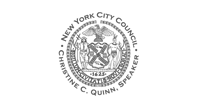
Dear New Yorker,
Two weeks ago we were reminded that our city is vulnerable to the forces of nature, that the reality of climate change puts our homes and safety at risk.
Since then New Yorkers have risen to the occasion time and again to help those in need in the aftermath of Sandy. The outpouring of muscle and support has been truly amazing. Thank you!
Here at the City Council, we're also taking steps to help our city rebuild and ensure that we're better able to withstand future storms.
Yesterday, for example, we voted on a Capital Budget Modification to allocate funds needed for Hurricane Sandy-related emergency repair work, allowing for expedited repairs of public school and hospital facilities severely affected by the storm. This funding will help to repair facilities that are urgently needed so that patients have a place to be cared for, and so our students will have places to learn.
We have also moved City Council staffers out of City Hall and into disaster zones to help victims, and are continuing to work with local Council Members and community leaders to help coordinate relief efforts and respond to problems as they come up.
And we're focusing on the future – even as recovery efforts continue.
That's why yesterday I presented a series of proposals for better preparing New York for the consequences of global climate change and any severe weather events that come our way. These proposals include:
- An agreement with the Bloomberg Administration to accelerate the completion of two studies to analyze risks facing NYC and best protections. Both studies will be completed by April 2013;
- An announcement that Senator Charles Schumer will lead the effort to obtain an Army Corps of Engineers study that will conclusively analyze whether or not to build storm surge barriers or other protective structures to guard against flooding;
- Better preparing Con Edison and other utilities to handle future storms and emergencies, including burying power lines in vulnerable neighborhoods;
- Major changes to our region's gasoline distribution network;
- Accelerating investment in NYC's sewer system and related infrastructure;
- Seeking safeguards against flooding of the city's transportation system; and
- Convening emergency meetings of NYC's Building Resiliency Task Force to evaluate potential building code changes.
Finally, the Council and I will be holding a series of public hearings in the weeks and months ahead on everything from public safety to health care in the wake of Sandy to Con Ed's handling of the storm. Details will be posted on our website at www.council.nyc.gov as soon as they become available.
Again, our heartfelt thanks to everyone who has sprung into action these past two weeks.
We'll continue to get through this together. And we'll continue to harness the energy and generosity that we've seen in the aftermath of Sandy to help make our neighborhoods and city safe, stronger and more resilient to future storms.
You can read more about these efforts on the Council's website at www.council.nyc.gov.
Sincerely,
Christine C. Quinn
Speaker
NYC Council
